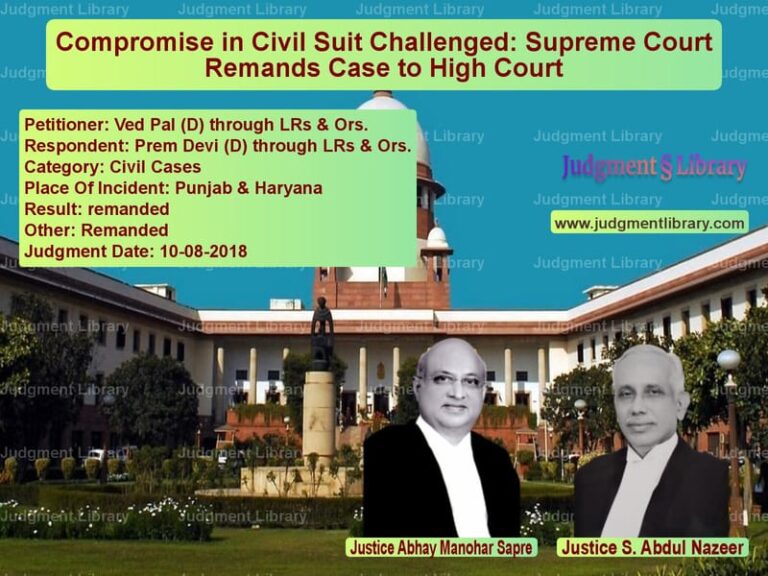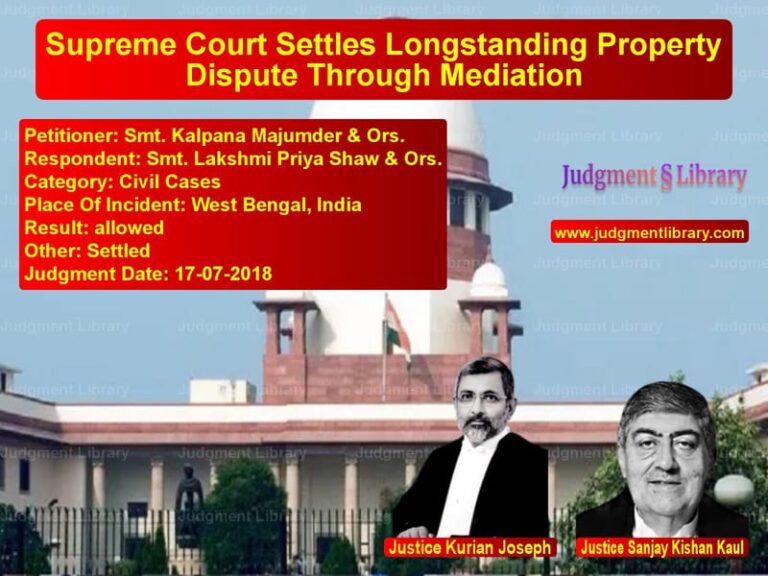Supreme Court Clarifies Power to Modify Arbitral Awards Under Arbitration Act
The Supreme Court of India recently delivered a landmark judgment addressing a critical question in arbitration law: whether courts have the power to modify arbitral awards under Sections 34 and 37 of the Arbitration and Conciliation Act, 1996. The case, Gayatri Balasamy v. M/S ISG Novasoft Technologies Limited, was referred to a five-judge bench to resolve conflicting judicial opinions on this issue. The judgment has far-reaching implications for arbitration proceedings in India, particularly in commercial disputes.
The dispute arose from divergent views among courts on whether the power to ‘set aside’ an arbitral award under Section 34 of the Act inherently includes the power to ‘modify’ such awards. While some judgments permitted modification, others, notably Project Director NHAI v. M. Hakeem (2021), held that courts could only set aside awards entirely, not modify them. This inconsistency led to the reference to a larger bench for clarity.
The petitioners argued that reading the power to modify into Section 34 would align with international practices and prevent unnecessary delays. Senior Counsel Arvind Datar contended, “The court is not powerless to add words to avoid irreconcilable conflict and avert absurdity and injustice.” He suggested inserting phrases like “and, to the extent” into Section 34(2)(b) to clarify this power. The petitioners also invoked the legal maxim omne majus continet in se minus (the greater contains the lesser), arguing that the power to set aside must include the lesser power to modify.
On the other hand, the respondents, represented by Solicitor General Tushar Mehta, opposed this interpretation. They emphasized that the Arbitration Act, unlike its predecessor (the 1940 Act), deliberately omitted any provision for modification. “Section 34 was modelled on the UNCITRAL Model Law, which does not permit modification. If Parliament intended to grant this power, it would have done so expressly,” he argued. The respondents also highlighted practical concerns, noting that modified awards might face enforcement challenges under international conventions like the New York Convention.
The court analyzed the scheme of the Arbitration Act, noting its emphasis on minimal judicial intervention. Section 5 explicitly states that “no judicial authority shall intervene except where so provided in this Part,” reinforcing the limited scope of court involvement. The bench observed that while the 1940 Act allowed modification under Section 15, the 1996 Act consciously departed from this approach to align with international standards.
Justice Sanjiv Khanna, writing for the majority, clarified that while courts cannot modify awards on merits, they retain limited powers in specific circumstances: “The court can sever invalid portions of an award if they are separable, correct clerical or computational errors, and adjust post-award interest rates where justified.” The judgment also affirmed that courts could remand matters to arbitral tribunals under Section 34(4) to cure defects without annulling the entire award.
On the question of interest, the court held that post-award interest rates could be modified if the tribunal’s decision was manifestly unreasonable. “The arbitrator cannot foresee future events affecting interest rates. Courts may intervene to ensure fairness, provided they do not re-examine the merits,” the bench noted. However, it cautioned against routine interference, stressing that modifications should be rare and based on clear legal principles.
The judgment also addressed concerns about statutory arbitrations, such as land acquisition cases under the National Highways Act. While acknowledging the unique public law elements, the court declined to expand Section 34’s scope, stating that remedies for inadequate compensation must be sought through legislative amendments or writ jurisdiction, not by distorting arbitration law.
In conclusion, the Supreme Court upheld the Hakeem decision, ruling that courts cannot modify arbitral awards unless the exceptions outlined above apply. The bench emphasized that any broader reform must come from Parliament, not judicial interpretation. “The A&C Act balances finality and fairness. While hardship arguments are understandable, they cannot override the statute’s plain language,” Justice Khanna observed. The judgment reinforces India’s commitment to arbitration as a swift, binding dispute-resolution mechanism while providing much-needed clarity on judicial powers.
Petitioner Name: Gayatri Balasamy.Respondent Name: M/S ISG Novasoft Technologies Limited.Judgment By: Justice Sanjiv Khanna, Justice B.R. Gavai, Justice Sanjay Kumar, Justice Augustine George Masih.Place Of Incident: India.Judgment Date: 30-04-2025.Result: dismissed.
Don’t miss out on the full details! Download the complete judgment in PDF format below and gain valuable insights instantly!
Download Judgment: gayatri-balasamy-vs-ms-isg-novasoft-tec-supreme-court-of-india-judgment-dated-30-04-2025.pdf
Directly Download Judgment: Directly download this Judgment
See all petitions in Arbitration Awards
See all petitions in Commercial Arbitration
See all petitions in Enforcement of Awards
See all petitions in Arbitration Act
See all petitions in Dispute Resolution Mechanisms
See all petitions in Judgment by Sanjiv Khanna
See all petitions in Judgment by B R Gavai
See all petitions in Judgment by Sanjay Kumar
See all petitions in Judgment by Augustine George Masih
See all petitions in dismissed
See all petitions in supreme court of India judgments April 2025
See all petitions in 2025 judgments
See all posts in Arbitration and Alternate Dispute Resolution Category
See all allowed petitions in Arbitration and Alternate Dispute Resolution Category
See all Dismissed petitions in Arbitration and Alternate Dispute Resolution Category
See all partially allowed petitions in Arbitration and Alternate Dispute Resolution Category







